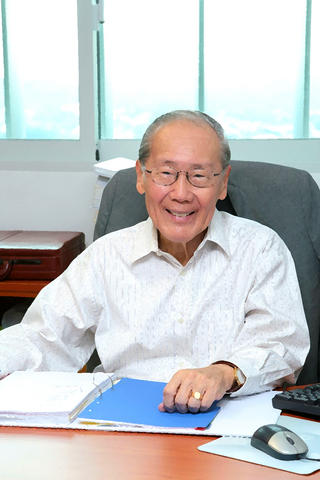Chinese people living in countries throughout Southeast Asia share the same cultural identity, but that doesn't necessarily translate into political identification with China.
Wang Gungwu (王賡武), chairman of Singapore's Lee Kuan Yew School of Public Policy and a respected Sinologist, is one of the foremost experts on Chinese migration and what it means to be huaqiao (華橋), or overseas Chinese.
The former director of Singapore's East Asian Institute will present some of his ideas, which he developed over a 40-year career as a researcher, in a lecture hosted by the Lung Ying-tai Cultural Foundation (龍應台文化基金會).

PHOTO: COURTESY OF THE LUNG YING-TAI CULTURAL FOUNDATION
"The confusion for some is that in Asia the concept of a political identity and a cultural identity has to be understood as being two different things and they are not exclusive," Wang said recently in an interview published in the academic journal Asian Affairs. "Most [overseas Chinese] … identify themselves with the country where they live. A Chinese in Thailand is first of all a Thai."
Wang's lecture will focus on the different attitudes huaqiao living in Malaysia and Singapore hold toward Chinese tradition. He will use his experience to examine the situation in Taiwan and predict what the future may hold.
Wang has written extensively on Chinese identity in overseas communities. His recently published Divided China: Preparing for Reunification, 883-947 is an examination of the 53-year period separating the fall of the Tang Dynasty and the founding of the Sung Dynasty. Earlier works dealing with China and Chinese migration include China and Southeast Asia: Myths, Threats and Culture, The Chinese Overseas: From Earthbound China to the Quest for Autonomy and Joining the Modern World: Inside and Outside China.

Behind a car repair business on a nondescript Thai street are the cherished pets of a rising TikTok animal influencer: two lions and a 200-kilogram lion-tiger hybrid called “Big George.” Lion ownership is legal in Thailand, and Tharnuwarht Plengkemratch is an enthusiastic advocate, posting updates on his feline companions to nearly three million followers. “They’re playful and affectionate, just like dogs or cats,” he said from inside their cage complex at his home in the northern city of Chiang Mai. Thailand’s captive lion population has exploded in recent years, with nearly 500 registered in zoos, breeding farms, petting cafes and homes. Experts warn the

No one saw it coming. Everyone — including the Chinese Nationalist Party (KMT) — expected at least some of the recall campaigns against 24 of its lawmakers and Hsinchu Mayor Ann Kao (高虹安) to succeed. Underground gamblers reportedly expected between five and eight lawmakers to lose their jobs. All of this analysis made sense, but contained a fatal flaw. The record of the recall campaigns, the collapse of the KMT-led recalls, and polling data all pointed to enthusiastic high turnout in support of the recall campaigns, and that those against the recalls were unenthusiastic and far less likely to vote. That

The unexpected collapse of the recall campaigns is being viewed through many lenses, most of them skewed and self-absorbed. The international media unsurprisingly focuses on what they perceive as the message that Taiwanese voters were sending in the failure of the mass recall, especially to China, the US and to friendly Western nations. This made some sense prior to early last month. One of the main arguments used by recall campaigners for recalling Chinese Nationalist Party (KMT) lawmakers was that they were too pro-China, and by extension not to be trusted with defending the nation. Also by extension, that argument could be

Aug. 4 to Aug. 10 When Coca-Cola finally pushed its way into Taiwan’s market in 1968, it allegedly vowed to wipe out its major domestic rival Hey Song within five years. But Hey Song, which began as a manual operation in a family cow shed in 1925, had proven its resilience, surviving numerous setbacks — including the loss of autonomy and nearly all its assets due to the Japanese colonial government’s wartime economic policy. By the 1960s, Hey Song had risen to the top of Taiwan’s beverage industry. This success was driven not only by president Chang Wen-chi’s